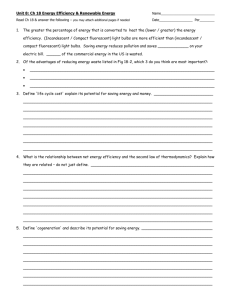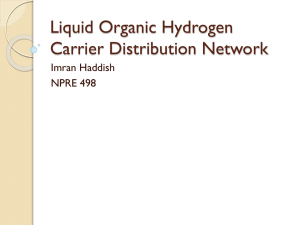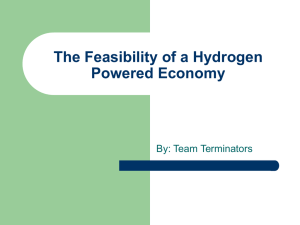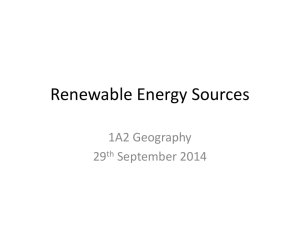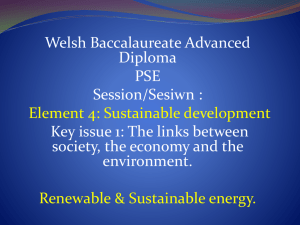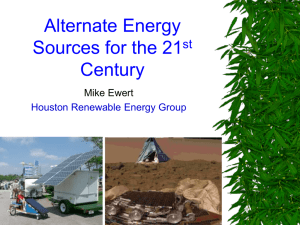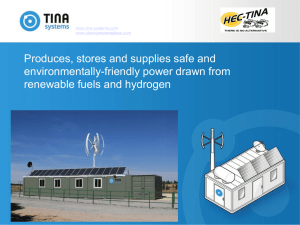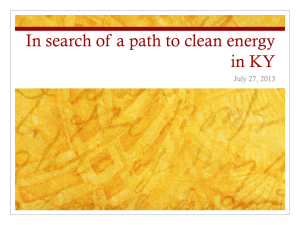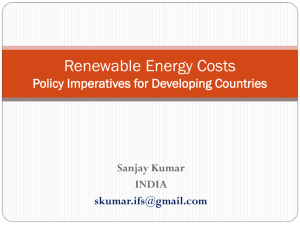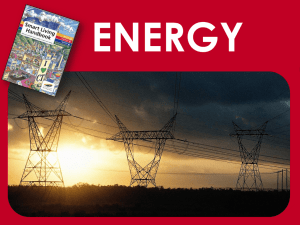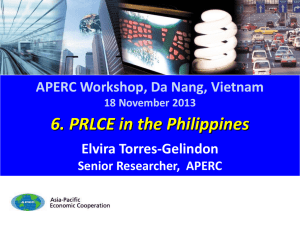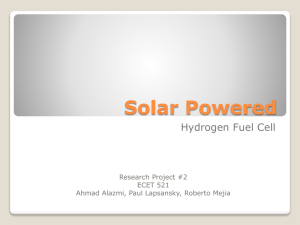Lab 7 - Renewable Energy
advertisement
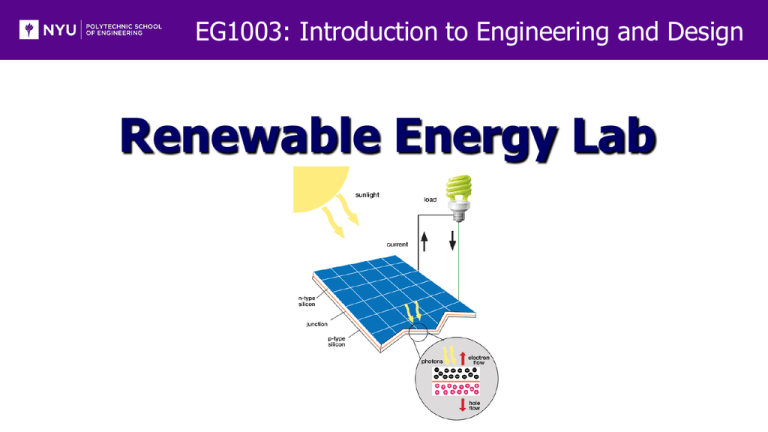
EG1003: Introduction to Engineering and Design Renewable Energy Lab Overview Experimental Objective Background Information Materials Procedure Assignment Closing Experimental Objective Test the capabilities of solar panels and wind turbines Test the capabilities of the hydrogen fuel cells and capacitors Design a renewable energy car to compete against the other groups Background Information Renewable Energy Solar panels Wind-turbine technology Hydrogen fuel cells Electronic Components Renewable Energy Harnessed from nature resources Clean energy sources Sources for energy are abundant in supply[1] Solar Panels Made from silicon or copper indium gallium (di)selenide (CIGS) Converts Sunlight to electrical current Absorbed sunlight excites electrons to allow freedom of motion (generates an electric current)[2] Wind-turbine technology Use pressure difference generated by the wind to spin the turbine blades Converts mechanical energy into electrical energy The wind vane (10) is use to determine the direction the wind-turbine will face[3] Hydrogen Fuel Cells Stores chemical energy and converts it into electrical energy Types of fuels used includes (but not limited to) hydrogen, methane, and gasoline Reversible fuel cells can separate water into hydrogen and oxygen, then use it to generate electrical energy [4] Electronic Components A capacitor is an electrical device used to store charge Capacitors can be connected in parallel (increases charge stored) and in series (increases voltage stored)[5] Competition Rules Power storage devices must be contained in the car The only power sources allowed are the windturbine and solar panel The renewable energy car may not be pushed or launched The renewable energy car should not be touched after it has started to move The car will run for up to two minutes or until the car comes to a stop Materials Horizon Wind-Turbine Solar Battery Panels Adjustable Table fan Heat Lamp DMM (Digital Multi-meter) Music Voltmeter 2V DC Motor Horizon Hydrogen Fuel cell 1 Farad 2.5V Capacitor Mini Electric propeller LED (Light Emitting Diode) Alligator cable sets Standard Lego Car Chassis plus Lego parts kit Lego to Alligator Cable Clip Connector Scissors Tape Materials Price List Horizon Wind-Turbine ($5.00/each) Solar Battery Panels ($10.00/each) Horizon Hydrogen Fuel cell ($12.00/each) 1 Farad 5.5V Capacitor ($3.00/each) Alligator cable sets ($0.50/each pair) Standard Lego Car Chassis plus Lego parts kit (only one kit) Lego to Alligator Cable Clip Connector ($0.10/each) Tape ($0.10/feet) Procedure Part 1:Test the Power sources using music voltmeter Solar panel Wind-turbine Part 2: Test the power storage devices Hydrogen fuel cell Capacitor Part 3: Design a renewable energy car using the power sources and power storage devices of your choice Procedure Here is an inspiration for your design! Assignment: Report Individual Lab Reports Title page Discussion of topics in the manual Include a picture of your vehicle Scan in lab notes (ask TA for assistance) TA must initial that table and graph were completed Assignment: Presentation Team presentation State rules of competition Describe your design and its concepts Include table of class results, cost and photo/video of design How could your current design be improved? Refer to “Creating PowerPoint Presentations” found on EG website Closing Have all original data signed by TA Submit all work electronically Clean up workstations Return all materials to TA Works Cited Eriksson, J.. "Renewable energy vs. fossil fuel." Renewable power news. N.p., 2010. Web. 26 Jul 2012. <http://www.renewablepowernews.com/archives/1413>. [1] http://www.agc-flatglass.com/AGC-Flat-Glass/English/Other/News-Overview/NewsDetail/page.aspx/1014?newsitem=1273[2] . The structure of a modern wind turbine – an overview. N.p., n.d. Web. 26 Jul 2012. <http://www.wwindea.org/technology/ch01/en/1_2.html>. [3] Reg Tyler, . "Types of Fuel Cells." Energy efficeny and renewable energy. U.S. Department of Energy, 2011. Web. 24 Jul 2012. <http://www1.eere.energy.gov/hydrogenandfuelcells/fuelcells/fc_types.html>. [4] . Rotational Equilibrium. WWU, n.d. Web. 26 Jul 2012. <http://faculty.wwu.edu/vawter/PhysicsNet/Topics/TopicsMainTemplate.html>. [5] http://www.horizonfuelcell.com/files/Education_Series_PDF.pdf[6]
